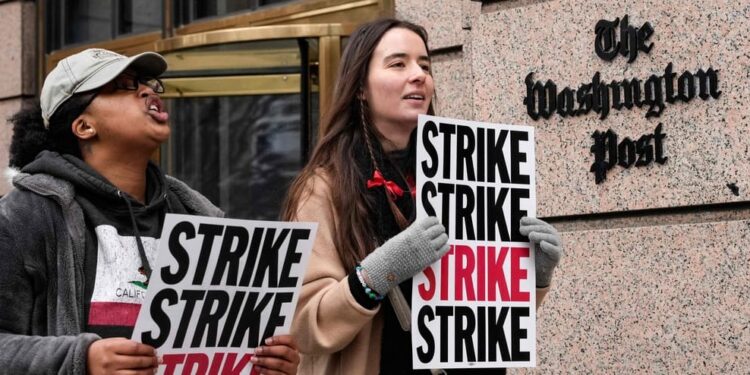“Do not consume Post content today!”: The Washington Post employees’ union on Thursday called on readers of the prestigious American daily to boycott the newspaper’s production these days, in solidarity with the striking staff.
The Washington Post Guild union announced Tuesday that several hundred employees would go on strike for a day, denouncing management’s lack of willingness to “negotiate in good faith” and as it raises the specter of new layoffs .
The work stoppage comes after 18 months of discussions on a new agreement which notably concerned salary demands or teleworking.
“Taking this historic step is not a decision we took lightly,” the Washington Post Guild said in a letter sent to readers Tuesday announcing the strike.
According to the union, the management of the daily owned by billionaire Jeff Bezos “has – repeatedly and illegally – interrupted negotiations on key subjects, including salaries, support for the mental health of employees, and voluntary departures”.
The Washington Post Guild represents some 1,000 daily employees in both editorial and support roles, according to its website.
In October, a few months after the elimination of its Sunday magazine, “WaPo” announced staff cuts with plans for voluntary departures for 240 people, out of a total workforce of 2,500 employees.
According to the newspaper’s interim boss, Patty Stonesifer, previous management had shown “excessive optimism” about the situation and future of the company.
Traditional American media have been experiencing difficulties for several years, in a context of a sharp decline in readership in favor of social media platforms.
Public radio NPR notably announced in March to reduce its workforce by 10% and the elimination of four podcasts.
And strikes took place within the New York Times and the largest newspaper network in the country, Gannett, which notably publishes USA Today and more than a hundred local newspapers.
The U.S. media industry saw more than 17,500 job cuts in the first half of 2023 alone, according to a report from HR consulting firm Challenger, Gray, and Christmas.
And over the last two decades, more than 2,500 newspapers have closed their doors in the country.



